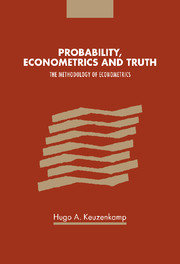Book contents
- Frontmatter
- Contents
- Introduction
- 1 The philosophy of induction
- 2 Probability and indifference
- Intermezzo: a formal scheme of reference
- 3 Relative frequency and induction
- 4 Probability and belief
- 5 The theory of simplicity
- 6 From probability to econometrics
- 7 Econometric modelling
- 8 In search of homogeneity
- 9 Positivism and the aims of econometrics
- 10 Probability, econometrics and truth
- Personalia
- References
- Name Index
- Subject Index
2 - Probability and indifference
Published online by Cambridge University Press: 22 September 2009
- Frontmatter
- Contents
- Introduction
- 1 The philosophy of induction
- 2 Probability and indifference
- Intermezzo: a formal scheme of reference
- 3 Relative frequency and induction
- 4 Probability and belief
- 5 The theory of simplicity
- 6 From probability to econometrics
- 7 Econometric modelling
- 8 In search of homogeneity
- 9 Positivism and the aims of econometrics
- 10 Probability, econometrics and truth
- Personalia
- References
- Name Index
- Subject Index
Summary
One regards two events as equally probable when one can see no reason that would make one more probable than the other.
Laplace (cited in Hacking, 1975, p. 132)Introduction
Are scientific theories ‘probabilifiable’? Lakatos (1978, p. 20), who phrases this question, says no. According to the probabilistic response to Humean scepticism, however, the answer should be affirmative, although the justification for the affirmative answer is problematic. The crossroads of philosophy of science and probability theory will be the topic of chapters 2 to 4.
There exist different versions of probabilism. The roots of modern probability theory lie in Laplace's indifference theory of probability, which has been supported by economists such as John Stuart Mill and W. Stanley Jevons. Laplace's theory is complemented by the theory of the English Reverend Thomas Bayes. Their interpretation of probability, which is based on ‘equally probable’ events, will be presented in chapter 2, section 2.
Since the days of Bayes and Laplace, confusion has existed about whether probability refers to a property of events themselves, or beliefs about events. For this purpose, it is useful to make a distinction between the realist or aleatory interpretation of probability on the one hand, and the epistemological interpretation of probability on the other hand (Hacking, 1975).
Aleatory stems from the Latin word for ‘die’ (alea jacta est). The aleatory view has its roots in the study of games of chance, such as playing cards and casting dice.
Information
- Type
- Chapter
- Information
- Probability, Econometrics and TruthThe Methodology of Econometrics, pp. 21 - 27Publisher: Cambridge University PressPrint publication year: 2000
